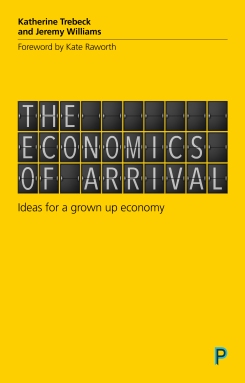This website uses cookies so that we can provide you with the best user experience possible. Cookie information is stored in your browser and performs functions such as recognising you when you return to our website and helping our team to understand which sections of the website you find most interesting and useful.
Blog by WEAll’s Katherine Trebeck and Jeremy Williams to mark the launch of their new book “The Economics of Arrival: ideas for a grown up economy” on 15 January 2019. Blog originally published on Policy Press.
As we enter 2019, there is one thing that all the commentators and punters seem to agree on: no one can really predict what will happen as the months unfold.
What form will Brexit take? Will Trump’s trade wars lead to hostility between nations or will he pull off a peace deal with North Korea? What will the gadget be that people flock to? Will 2019 be the year that plastic bags increase to 10p each in the UK and plastic straws become a thing of the past?
“So many of the factors that shape one’s life are determined in realms beyond your control.”
Against these multilayered uncertainties is the uncertainty that the majority of people have been dealing with for some time: so many of the factors that shape one’s life are determined in realms beyond your control. In boardrooms that decide your pay and hours. In algorithms that shape political decisions. In weather that is more extreme due to the pollution and emissions of the richest. In navigating social interactions charged with pressure to look a certain way, own certain things, or even to pose and pout in a certain way.
It is no wonder that more and more people are grasping for something different, whether it is apparently simple solutions offered at the ballot box or stepping outside the mainstream into alternative lifestyles.
This individual searching is mirrored in the economy writ large, which also needs to find a different direction. It needs a new project that recognises that the growth-oriented economy of the 20thcentury has delivered, but that now, many parts of the world are entering a period where growth is bringing a diminishing suite of benefits and often even increasing harm. The institutions and policies that once rendered growth positive (such as progressive taxation, collective provision of health services and education, or labour market arrangements that balanced power more equally between workers and the owners of capital) are being eroded. This is leaving the benefits of growth to be enjoyed by fewer and fewer people. Pursuit of ever more growth is often driving increasing problems that require yet more resources to fix.
“The pursuit of more poses ever greater risk for people and planet – and yet it, the idea of growth, has a stranglehold on our political and economic systems.”
The pursuit of more poses ever greater risk for people and planet – and yet it, the idea of growth, has a stranglehold on our political and economic systems.
It is time for such economies to recognise that they have arrived.
‘Arrival’ is about adequacy, being able to meet basic needs. It is primarily a material notion, a matter of having the resources to deliver a good life.
It confronts the ostensibly forbidden question of whether development has a destination.
Crucially, however, having enough resources collectively does not necessarily mean everyone individually has enough. Arrival does not imply that everything is resolved and everyone has what they need. Rather, it is the idea that a society collectively has the means for this.
“Failure to share the world’s harvest, both within and between countries, is one of the most enduring frustrations and tragedies of our time.”
Failure to share the world’s harvest, both within and between countries, is one of the most enduring frustrations and tragedies of our time. It is the cause of so many of the challenges and uncertainties that people, politicians, businesses and communities are wrestling with as 2019 unfolds.
Perhaps 2019 will be the year in which people recognise that growth has reached a point where a high standard of living could, theoretically, be universal.
Realising that possibility demands a new project – using resources in a smarter, fairer way, rather than wasting or hoarding them; focusing on the quality and distribution of economic activity and material resources. That is the task of ‘making ourselves at home’.
Once the delusion of growth as both an end in itself and the best of all possible means is discarded, discussion can then turn to what sort of economy we can create, to making better use of what has already been accumulated and, perhaps more than anything, ensuring it is fairly distributed.
Many aspects of this ‘grown up’ economy are already in existence – and indeed flourishing. From pro-social businesses to the ‘remakeries’ that are popping up in high streets. From policy makers creating incentives for the circular economy, to the city mayors using participatory budgeting.
Making ourselves at home is an economy in which there is scope for continuous improvement. Science and technology will advance. Human creativity and imagination are boundless. The economy will remain dynamic.
What changes is the ultimate goal. Making ourselves at home is an ethos of qualitative improvement that is a very different system-wide goal to the sometimes meaningless, sometimes harmful, and sometimes unnecessary, pursuit of more.
 The economics of arrival by Katherine Trebeck and Jeremy Williams is available on the Policy Press website. Order here for £11.99.
The economics of arrival by Katherine Trebeck and Jeremy Williams is available on the Policy Press website. Order here for £11.99.
the discussion?
Let us know what
you would like
to write about!

